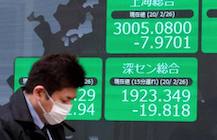The FTSE 100 index in London fell 11.1% this week – wiping £210.3 billion off the value of its constituent companies’ shares and marking its worst week since the 2008 financial crisis, according to Refinitiv.
Globally, the MSCI All Country World Stocks Index also suffered major falls – more than 10% for the week — equating to loss of more than $5 trillion.
The FTSE 100 index closed on Friday at 6580.61 points – down 215.79.
“The last time the index declined more in a single calendar week was week ending 10/10/2008, where it declined 14.32%,” said Refinitiv.
“This week also marks the 2nd largest weekly decline over the last 20 years.”
The Vix — an indicator of expected volatility in US stocks — is at its highest level since August 2011 and fast approaching an index level of 50.
“We believe the ongoing equity sell-off has further to go, and we reiterate our underweight of global equities and defensive stance,” wrote Daniel Grosvenor, Director Equity Strategy, Oxford Economics in a note.
“At the time of writing (intraday Friday 28th), the US S&P 500 index is down 15% from it’s peak, having posted the quickest 10% decline on record.
“However, this decline is well short of the average historic correction of 21%.
“It is now in-line with the average ‘non-recessionary’ pullback of 15% but these are typically arrested by investors anticipating a policy response and, as we argued in this month’s Global Asset Allocation report, it is difficult to see how policy easing can have a meaningful impact on investor sentiment today given nature of current concerns.
“Markets are likely to remain driven by newsflow on the scale of the virus outbreak and, given the still elavated level of equity valuations, we feel comfortable waiting for clearer signs that the spread is contained before we think about trimming our equity underweight or putting our precautionary cash positions to work. In the meantime, any recoveries are likely to prove short-lived as downward earnings revisions accelerate.”
Keith Lerner, SunTrust’s chief market strategist, wrote: “Investors are selling stocks first and asking questions later.
“We are seeing signs of pure liquidation. ‘Get me out at any cost’ seems to be the prevailing mood.
“There is little doubt the coronavirus will continue to weigh on the global economy, and the U.S. will not be immune.
“There is much we do not know.
“However, it is also premature to suggest the base case for the US economy is recession.”
